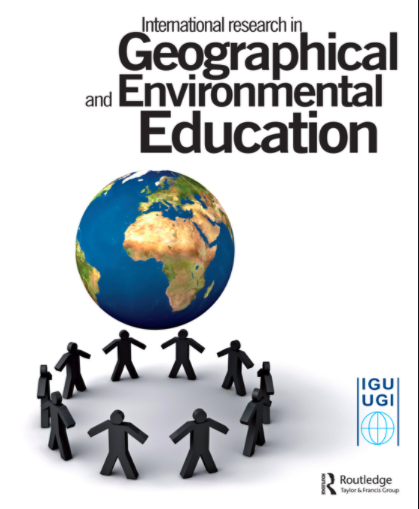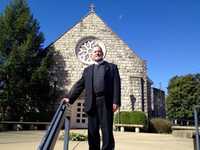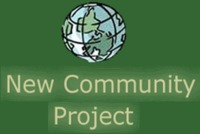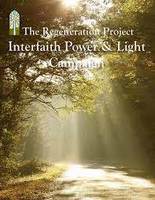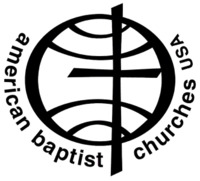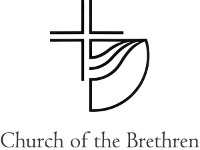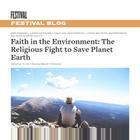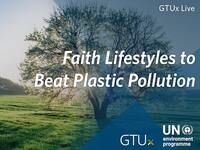Search
123 items
-
10 Eco-Mission Projects
Evangelical Environmental Network MOMS has created a list of family oriented service projects that focus on the environment. These ideas not only offer ways to serve the community, but also take care of God’s earth in simple but effective ways. -
For Love of Lavender
For Love of Lavender is an account of how Christine Sine, creator of Godspace and writer for Evangelical Environmental Network MOMS, encountered God through the beauty, fragrance, and abundance of the lavender in her garden. Reflecting on her garden informs her of God's work and calls to mind numerous bible verses, including Proverbs 27:9: The heart is delighted by the fragrance of oil and sweet perfumes, and in just the same way, the soul is sweetened by the wise counsel of a friend. Christine also mentions how to use these lessons to teach children. -
How do we Communicate Environmental Ethics? Reflections on Environmental Education from a Kuwaiti Perspective
Dr. Khadija al-Naki, an educational researcher, discusses Islamic thought in relation to environmental education. Comparing Islamic teachings with Western environmental ethics, al-Naki opens a conversation on how to develop an environmental curriculum in Islamic education systems. This article leaves the reader questioning the role of education in the environmental movement.
Published in the journal International Research in Geographical and Environmental Education. -
Manifesto for an Ecological Reformation of Christianity
This Manifesto by the World Council of Churches is a call to examine Christian practices that may be harmful to the Earth, humans, and other species. It urges individuals instead to focus on what various “eco-congregations” or “green churches” are doing. The following manifesto excerpt provides a rationale for the need for ecological reformation:
"The need for an ecological reformation of all Christian traditions is of course manifested in different ways in various parts of the world. The pain impulses associated with ecological destruction have been registered especially in those areas that lie on the periphery of current constellations of economic power. The call for an ecological reformation of Christianity has come with particular urgency from Christians in such areas (the Pacific, Africa, Asia, Latin-America) as they are more exposed and vulnerable. This call is echoed by churches which belong to (mainly protestant) countries in the global North which have contributed heavily to the exploitation of natural resources, industrial production and a style of consumption that causes environmental degradation." -
Wanted: Innovative Farmers to Help Slow Algal Bloom on Lake Erie
The Christian Science Monitor has written an article discussing how agricultural nutrients in the Maumee River, Lake Erie’s biggest source of pollution, are reaching record proportions. Most nutrient pollution is caused by large storms, and with climate change, these storms are becoming increasingly more common. The USDA reports that farmers are making headway toward reducing nutrient pollution on a voluntary basis, but many researchers say that these efforts are not sufficient. A recent report suggests additional outreach, an increased focus of conservation dollars, and mandated soil testing.
Wetland restoration – bringing back bits of the Black Swamp— can play a pivotal role in clearing algal bloom in Lake Erie. The Black Swamp Conservancy is currently working on turning 60 acres back into swamp in northwestern Ohio. William Mitsch, a retired Ohio State University professor and wetlands expert, hopes to eventually restore a tenth of the Black Swamp (about 100,000 acres) to provide a substantial cleaning of Lake Erie. -
Saving Buffalo Reef
This 11-minute video, by the Great Lakes Indian Fish & Wildlife Commission (GLIFWC), informs the viewer of the natural, cultural, and economic importance of Buffalo Reef. This reef is located off the Keweenaw Peninsula, Michigan, in Lake Superior. Buffalo Reef is currently under ecological distress due to local mining activities. Current Tribal, State, Federal, and Academic efforts are underway to help restore this significant environmental feature, as documented in this video. -
Anamchara Faith Community Celebrates Earth Day 2016
This year, the Anamchara Faith Community will be providing an Earth Day celebration in the woods at Bernheim Forest in Bullitt County, Kentucky. The service will include biblical passages that give honor to the importance of trees, with the plan to plant at least one during this time. This service will draw from different faiths and cultures, ranging from the Catholic faith to Native American customs and traditions. -
Trees for the Earth
The Catholic community is joining with the Earth Day Network to help reach the goal of planting 7.8 billion trees by 2020. This would equate to one tree per person on earth. Pope Francis's recent encyclical, Laudato Si, focuses on the importance of trees and their benefits to the environment as well as human kind. -
Columbus YMCA Youth Engage in 4-H Urban Gardening Program for Cultural Exchange with Youth in Accra, Ghana
This summer, dozens of Columbus North YMCA youth participated in 4-H urban gardening programs as part of an urban agriculture exchange program with 4-H and YMCA youth from Accra, Ghana. In response, in May of 2017, three Ghanaian youth and an advisor will travel to Columbus to share their urban agriculture experiences at the annual Ohio Future Farmers of America (FFA) conference at the Ohio State Fairgrounds. Please click the link below to read more: -
Care for Creation Check List
This Care for Creation Check List is a conversation created by the nonprofit organization New Community Project. The Care for Creation Check List is meant to be read between two people or performed as a skit. One person reads the Genesis creation account while another person uses the list to gauge how other species are doing during the Age of Humans. -
The Regeneration Project
The Regeneration Project was created as the parent project of Interfaith Power&Light. It is meant to help deepen the connection between ecology and faith and to help people of faith recognize and fulfill their responsibility for the stewardship of creation. They do so through educational programs for clergy and congregations -
Fasting for Climate Justice
Fasting for Climate Justice is a resource from Global Catholic Climate Movement (GCCM ) on the practice of fasting for climate action through two initiatives: meatless Fridays and monthly fasting. The GCCM encourages abstinence from meat on Fridays as a way to reduce one’s negative impact on global climate change. The GCCM also promotes fasting for the climate which takes place the first day of each month. -
Tu B’Shvat: Trees’ ReBirth Day
The Jewish festival of Tu B’Shvat, also known as the New Year for Trees, celebrates the ReBirthDay of earthly trees and of the sacred and supernal Tree of Life. The celebration begins on January 30th and ends January 31st. It is celebrated with a Seder in which the menu is the fruits and nuts that are given by the trees. As a special aspect of their climate-crisis work, The Shalom Center is inviting people to create a special Trees of Life Fund for reforestation in the US. -
Evangelical Environmental Network: Trump Budget would harm National Parks and the Protection of God’s Other Creatures
The president of the Evangelical Environmental Network, Rev. Mitch Hescox, made a statement saying that the budget proposed by the Trump administration is a “devils bargain,” which would harm national parks and the protection of God’s creatures.
“The Trump Administration’s budget, if implemented, would be an abdication of our stewardship of our public lands, which are entrusted to each generation to pass on to their children.” -
Becoming a CreatureKind Institution
“Having compassion for others begs the question of who ‘the others’ are. The animals whom we farm are sentient beings and individuals in their own right, even when they are crowded together in barren cages or windowless sheds. They are surely – in their billions – ‘others’ who deserve and desperately need our compassion. I wish CreatureKind great influence in bringing compassion to these fellow-beings of ours.”
– Joyce D’Silva, Ambassador Emeritus,
Compassion in World Farming
CreatureKind is a Christian animal welfare group that works to help institutions improve their practice as it impacts farmed animals, with benefits for humans, animals, and the environment. Becoming a CreatureKind institution means committing to a cycle of reviewing current sourcing, setting goals for improved practice, and acting on them, together with engaging your community about the program. The program have two major goals: reduce consumption of animal products and obtain remaining animal products from higher welfare. -
CreatureKind Church Course
CreaturKind has created a 6-week course to help Christians think about what their faith means for animals. The course is free and is meant to assist churches in learning about animal welfare and how to care for animals faithfully. They aim to encourage Christians to consider what they believe about God’s creatures and how they might move toward living out those beliefs as members of the body of Christ. -
Environmental Statement – American Baptist Churches
Environmental problems that exists today have stemmed from humanity’s current and past greed. Science and technology are being abused and threaten to make problems worse, even though they have the power to make things better. American Baptists advocate that we must be stewards of our home and not abuse it if we wish to continue on as a species. In order to fix what humans have caused, we are called to recognize and preserve the earth and natural resources we have. -
Environmental Statement – Church of the Brethren
The Bible is filled with examples that demonstrate our responsibility to care for all creation on our planet. From Genesis to the parables of Jesus, it is explicitly stated that we must be caring stewards of the earth. In order to reverse the damage that humankind has done, the Church of the Brethren is calling its own members and all people to action. In addition, they are also calling upon the government to be more supportive of environmental policies and clean up. -
Environmental Statement – Reformed Church in America
In 1982, the Christian Action Commission of the Reformed Church in America (RCA) released a document titled “Care for the Earth: Theology and Practice.” This was given to General Synod, who then passed several resolutions outlining the Reformed Church in America’s stance on environmental issues. The Action Institute wrote the article below that discusses the resolutions that were passed. -
Faith in the Environment: The Religious Fight to Save Planet Earth
An article discussing the interfaith panel “Ways of Knowing, Ways of Living: Exploring Faith and Conservation” at the 2022 Smithsonian Folklife Festival. The author introduces the four panelists, their faiths, and their respective perspectives on encouraging intersections of faith and environmentalism, with Imam Saffet Abid Catovic representing Muslim faith, Jakir Manela representing Jewish faith, Michael Nephew representing Native American faiths, and Dr. Rachel Lamb representing (Evangelical) Christian faith. -
The Great Global Cleanup
This toolkit is intended to help guide people and groups on how to start and execute a cleanup project to restore communities.
"Follow our simple guide to make the most out of your cleanup. If you need any help, reach out to us at info@earthday.org." -
3000-year-old solutions to modern problems | Lyla June | TEDxKC
"In this profoundly hopeful talk, Diné musician, scholar, and cultural historian Lyla June outlines a series of timeless human success stories focusing on Native American food and land management techniques and strategies. Lyla June is an Indigenous musician, scholar and community organizer of Diné (Navajo), Tsétsêhéstâhese (Cheyenne) and European lineages. Her dynamic, multi-genre presentation style has engaged audiences across the globe towards personal, collective and ecological healing. She blends studies in Human Ecology at Stanford, graduate work in Indigenous Pedagogy, and the traditional worldview she grew up with to inform her music, perspectives and solutions. Her current doctoral research focuses on Indigenous food systems revitalization. This talk was given at a TEDx event using the TED conference format but independently organized by a local community." -
Sustainability Photo Contest
This RESTORExchange photo contest is being brought back from the pre-COVID era, and with an added collaboration with the Sustainability Institute. It's based around the question "What does sustainability look like?" This can include sustainability in environmental justice, technology, energy, lifestyle and wellbeing, society and culture, economy and politics, and any other context where you see sustainability in action. We want to see your perspectives and show all the different places that sustainability is practiced! Winning photos will be decided by a panel of judges (yet to be determined), and the top four photos will win a prize! First place will receive $400, second place will receive $300, third place will receive $200, and an honorable mention will receive $100. Submissions will be accepted through March 15, 2023. -
Faith Lifestyles to Beat Plastic Pollution
"Dr. Iyad Abumoghli and Sarah Berg, Acting Director for the Center for Climate Justice and Faith at Pacific Lutheran Theological Seminary, discuss the ways in which faith communities are uniquely positioned to combat the climate crisis.
This GTUx Lecture will specifically focus on actions that can be taken to combat plastic pollution — an area in which faith-based organizations are positioned to be significant catalyzers through educating, activating and inspiring their communities; developing capacity for sustainable practices; advocating policymakers and mobilizing the private sector; and collaborating with their community partners to advance change." -
Marianist Environmental Education Center
"The Marianist Environmental Education Center (MEEC) is an environmental education community in the Catholic tradition. In Mary's hope-filled spirit, we preserve and act in communion with the land and educate other communities in sustainability through ecology-based simple living, social justice and spirituality."



